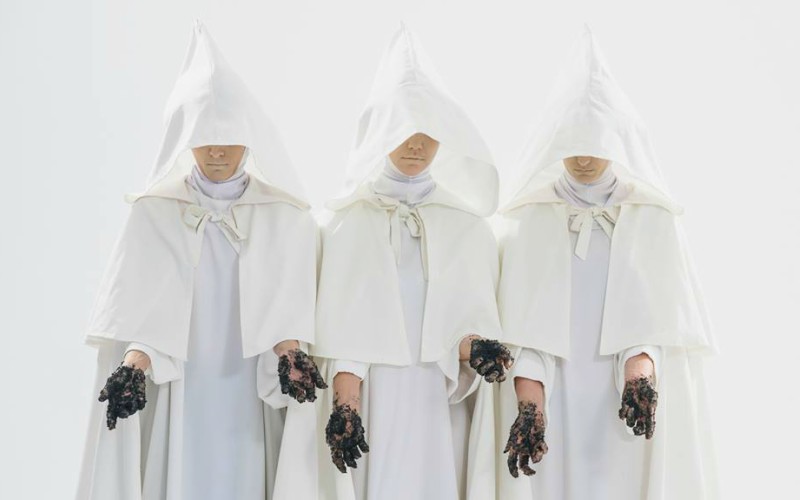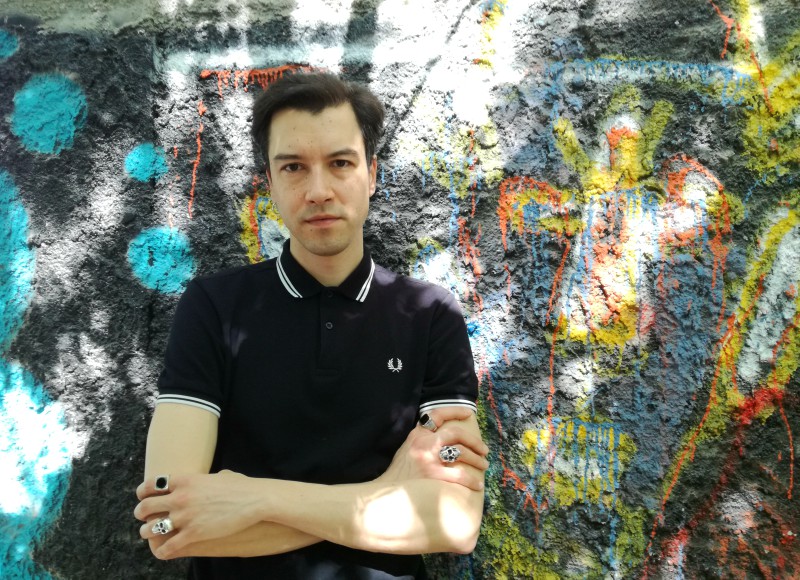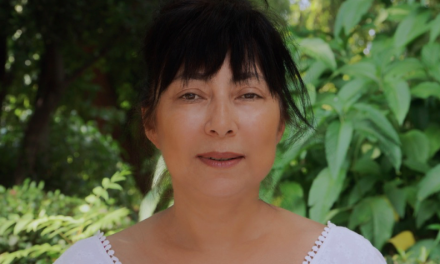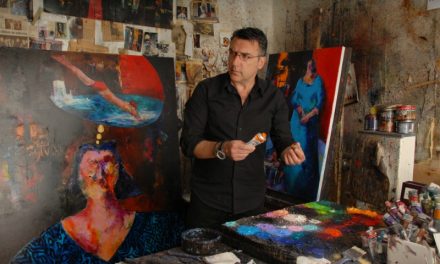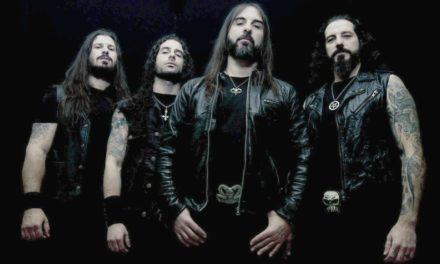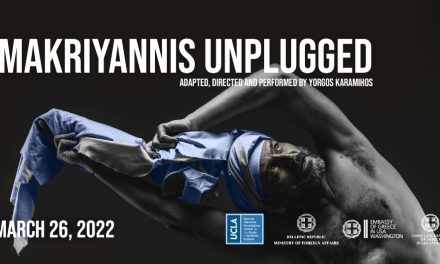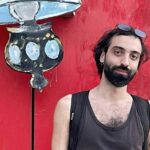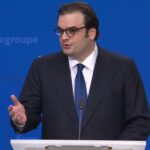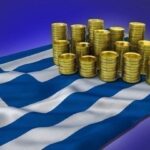Thanos Papakonstantinou is a stage director and actor who, despite his young age, has already earned the recognition of both peers and critics, having directed several productions staged by prestigious institutions. A graduate of the Aristotle University of Thessaloniki Law School, he went on to get a Diploma from the “Empros Theatre Workshop” School of Drama in 2009, while in 2011 he became one of the founding members of the Helter Skelter Theatre Company.
As part of the Helter Skelter Company, he has directed four plays at the Michael Cacoyannis Foundation, including his trilogy Carnage, based on Aeschylus’ Oresteia. In 2014 he participated in the Athens Festival with Yannis Mavritsakis’ Redwards Shift, while in 2017 he directed Monteverdi’s opera L’Orfeo at the Megaron – Athens Concert Hall. This summer, on July 20-21, he directs Sophocles’ tragedy Electra, in a production by the National Theatre of Greece presented at the Epidaurus Festival. We interviewed* Papakonstantinou on the challenges of first time directing of ancient drama.
Your ties with Greek mythology have been steadily present throughout your work. Your most recent production was an experimental staging of Claudio Monteverdi’s L’Orfeo, at the Athens Concert Hall, a collaboration with conductor Markellos Chryssicos. Has that been the only time you were a stage director for an opera?
Yes, for now.
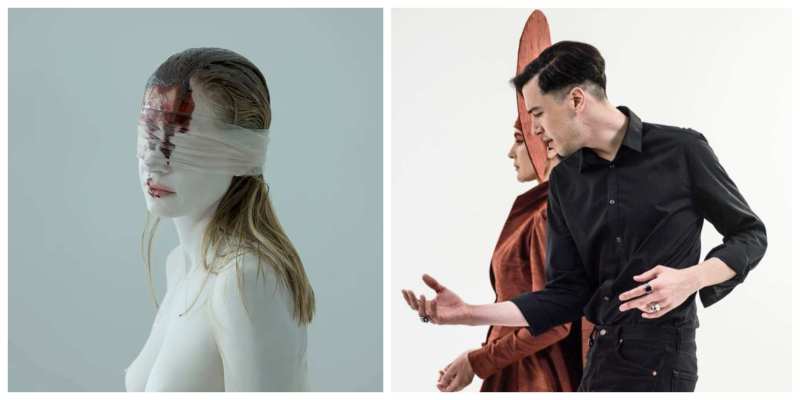 Left: L’ Orfeo at the Athens Concert Hall (Photo by Efi Gousi) Right: Electra at the Epidaurus Festival (Photo by Elina Giounanli)
Left: L’ Orfeo at the Athens Concert Hall (Photo by Efi Gousi) Right: Electra at the Epidaurus Festival (Photo by Elina Giounanli)
Would you want to do that again?
Definitely! I absolutely love this genre; I have been listening to opera from a very young age, it was something I was very happy doing, and I’d be glad to be given this chance again in the future. It was also great to start with this particular work, based on this subject and widely considered to be either the first or one of the first operas; moreover, I was grateful for the opportunity to work with Markellos, one of Greece’s most devoted Baroque music scholars, who had the original idea for the production. I hope to repeat the direction of this particular production, since it was very successful and I loved the result, and of course to work on an opera again.
You have directed the Carnage trilogy, consisting of the plays Venison (2012), Pedestal (2013) and Colossus (2017), which you wrote, inspired by the tragedies The Eumenides, The Libation Bearers and Agamemnon, respectively.
In fact, I wrote the last two in their entirety; in Venison, I had incorporated several texts by Dostoyevsky.
Was there a reason why you chose to stage your plays in this sequence, thus reversing the order in which the original plays appear in Aeschylus’ trilogy Oresteia?
Yes: Aeschylus’ Oresteia signals a transition from a retributive society, where the “eye for an eye” justice of the Furies prevails, to an organised society, a democracy governed by laws and rules, a justice epitomised by the institution of Areopagus, dictating the way citizens should conduct themselves. What interested me, however, was to demonstrate a movement towards the opposite direction: how we often drift from an organised society into disarray. The plays were arranged in that inverted order so that it all ends with Colossus, where everything traces back to this mother, this woman, who takes apart the world she created; all she gave birth to, she sucks it back in just like a black hole.
So everything goes back to zero, that is, to the acceptance that in order to start anew, all things must be destroyed and then created on a completely new basis. In Aeschylus’ trilogy, instead, everything works towards reparation. Of course, our world is totally different compared to that of Aeschylus’ world; in our world, the sequence I propose seemed more consistent.
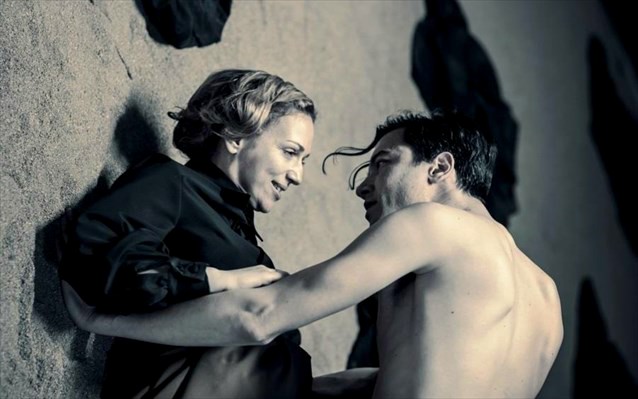 Colossus at the M. Cacoyannis Foundation (Photo by Stavros Habakis)
Colossus at the M. Cacoyannis Foundation (Photo by Stavros Habakis)
In a previous interview, you stated that the reason you chose to write your own plays was to shine a light on what has touched you personally in these tragedies. Now, with Electra, directing for the first time a tragedy in its original form, how different will your approach be?
There will surely be a different approach since, in my entire trilogy, I didn’t use anything from the original texts; my trilogy was the dramatisation of the myths and the material used in the tragedies, in my creative interpretation; these were independent works, based on the tragedies’ core, the way I perceived them, but definitely not actual renditions of those plays.
In Electra, Sophocles’ text is used; but what is of interest το me is how the material I handled in the previous productions will co-exist with the original text in this production. To me, this is the next stage of my involvement with tragedies. Since this play also forms part of the Mycenaean Saga, I pick up where I had left off, focusing on the same elements that interested me in the Oresteia – I don’t start off from a different perspective. These are the concept of ritual, the emphasis on visual imagery, the use of parallel action, the strong presence of sound and music and the musicality of speech; all elements which I hope will be functional within this new production.
You have also spoken of the decisive role that the venue and its stage play in your work as a director. This is your first production in an open air theatre. Will this determine your approach?
Absolutely. This is what has concerned me more than anything as a director: how to handle open-air space. I have never done it before and I actually like closed spaces in my work. I consider space to be of paramount importance in the work of a director, the way what you do function within the surroundings. Each venue, and especially open-air, sets its own rules; of course we each make our own choices, but to me it is essential to create something that makes sense in this particular setting, not something that would fit an indoors performance. This is a tough bet, but also an interesting quest.
There are different rules concerning, for example, acoustics and the placement of actors on stage. It’s not enclosed, so it is not easy to create an illusion – something that has been very important in my work, visually. I think there is a way to achieve that in an open space, but it is completely different. Everything seems to happen in the open, literally; there is no way to conceal something and then reveal it. Besides, I think the element of ritual is even stronger there; it’s like witnessing a sacrament, as in the Eucharist. So the illusion can be created through completely different means than those used in a roofed space, the audience is approached differently.
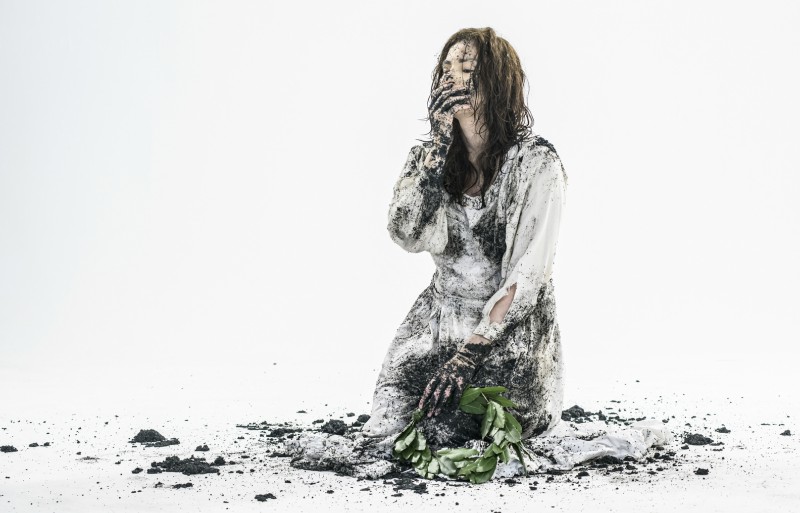 Electra by the Greek National Theatre at the Epidaurus Festival (Photo by Elina Giounanli)
Electra by the Greek National Theatre at the Epidaurus Festival (Photo by Elina Giounanli)
And what about the fact that this is not just any open space, but the famed Epidaurus theatre with all of its historical weight?
Well, that! It makes things much harder. First of all, I must say I am extremely happy and honoured to have been chosen by the National Theatre of Greece as part of its participation at the Epidaurus Festival. It is wonderful to see such important institutions give younger directors a chance to measure themselves with such a task. But this of course puts great pressure on a director: it’s the Epidaurus, and it’s an ancient tragedy. This theatre is of unique and great value, and it’s only right that it only hosts such productions. But it also carries such historical weight, there is this lore surrounding it; it can make someone -or at least me- think about the wrong things, as in how to differentiate oneself, how this or the other director have approached a play. I don’t think all this leads to anything useful. What matters in any staging is the way the text touches each artist, how it can initiate a personal dialogue between the author and the director. This is where you need to start from.
Where do the rehearsals take place?
At one of the National Theatre’s stages, but we will later have some time to rehearse in an open space, and just a few days of rehearsals on the actual stage of the Epidaurus theatre, before the premiere.
And how do you deal with this added difficulty of having to design you compositions and rehearse on a completely different stage than the one destined for the performance?
With a great deal of imagination! You have to really use your imagination to make up for it. I also drove off to Epidaurus and thought about how I would use the space. There is not much else you can do at this point. I try to familiriase myself with the open space, to sense it: just by standing there, you understand it has some obvious rules you need to comply with; one could of course also ignore them, but I believe you can’t help but follow them. The way this space is configured – without a roof, no walls, the stage being a circular orchestra, the audience surrounding the stage and looking down from above – all these and much more have to be kept in mind or it won’t work out.
Do you form part of the cast in this production?
No, I only direct.
Yet you have often performed roles in your own productions in the past. Is it more or less difficult to direct if you are also one of the actors in the show?
The way I work, I understand what it is that I want in a production even looking from the inside, as an actor on stage. It is of course more exhausting, but it’s something that can be done. I, in fact, have found myself in much more difficult or awkward positions in situations when I functioned solely as a director, rather than when I held this dual role. I actually think I have somehow a better perception of the requirements of a production when I find myself on the actors’ side as well; when I’m just on the other side I feel kind of cut off (laughs).
As you’ve said before, one shouldn’t compare himself with other directors. Have you however found yourself watching someone else’s productions and feeling envious, wishing you had thought of that idea yourself?
Definitely; I have felt very envious of Romeo Castellucci, Robert Wilson, Christoph Marthaler, Thomas Ostermeier, Frank Castorf; but also of Greek artists I admire, like Theodoros Terzopoulos and Dimitris Papaioannou.
And do you sometimes incorporate in your works some ideas you first encounter in someone else’s direction – not plagiarising but rather receiving influences?
Definitely – there‘s no other way to move forward. It sometimes works and sometimes it doesn’t, but in any case I feel like this starts off a dialogue with all the people I admire, either living or dead, not just stage directors but also cinema directors, writers, poets, painters; I think this dialogue is very obvious in my work, I want this and never cared if someone might think that I imitate the works of others.
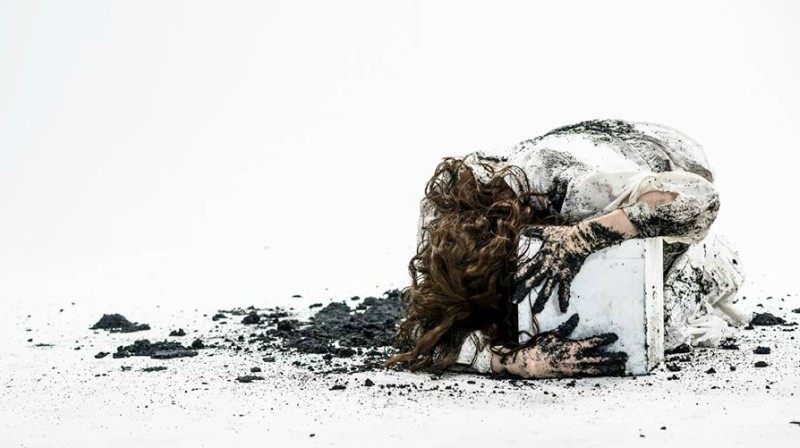 Electra by the Greek National Theatre at the Epidaurus Festival (Photo by Elina Giounanli)
Electra by the Greek National Theatre at the Epidaurus Festival (Photo by Elina Giounanli)
We have a great quantity of theatrical productions in Greece. Do you believe quality is also high?
Yes, we do have many interesting creators. Things had actually started to change around the time Yorgos Loukos took over as artistic director of the Athens Festival, opening it up and bringing us in direct contact with developments in the international theatre and performing arts scene. I think this benefitted the younger generation of artists immensely, since it’s very different to attend these shows live instead of watching a recording, keeping up with contemporary artistic production. Of course, there is no gain without loss, and these same conditions have also generated some coarse influences and hollow experimentations, but this is what always happens, and I don’t exclude myself.
The main reason for this is that modern Greece lacks a solid artistic tradition; artistic developments came to us late, often as unrefined influences brought here by the few who had the opportunity to travel abroad and have access to original ideas. But we haven’t had the opportunity to form a distinct identity for Greek dramatic arts. There was a rather abrupt transition in the late 80’s and early 90’s, which didn’t result from a gradual evolution based on a solid foundation, as was the case, for example, in British or French theatre. Hence, now there are those who show consistency in their creative quests and those who don’t.
Apart from director and actor, do you also consider yourself a playwright?
No, not at all; I like writing, meaning that I can, in fact, function as an author, but I always have in mind one particular stage composition. The text doesn’t precede the directing concept, it results from it; wording has never been my starting point. I start off with a character, a theme, a myth that interests me, I conceive the idea for the direction and then I move on to the dialogue. In my productions, the text doesn’t have a central role, it is equally important as all the other elements of this synthesis. So I don’t feel like a playwright at all.
*Interview by Nefeli Mosaidi
Read also via Greek News Agenda: Conductor Markellos Chryssicos on Baroque music and its dialogue with the Greek tradition; “Epidaurus Lyceum” Ancient Drama School comes back this summer; Composer and harpsichordist Panos Iliopoulos on his (unorthodox) approach to music making; Kostas Georgousopoulos on contemporary Greek Theatre
